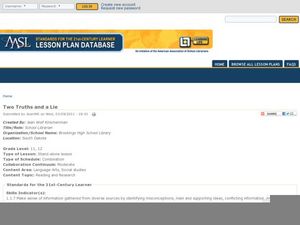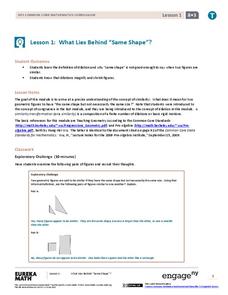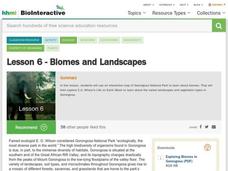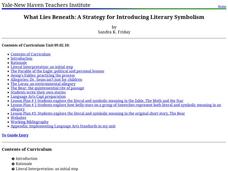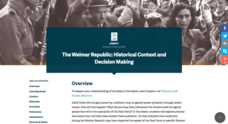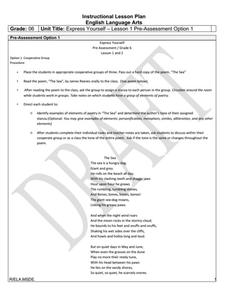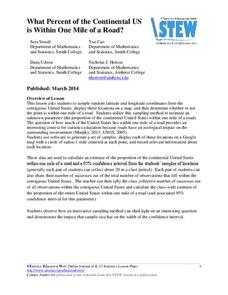Novelinks
Zach’s Lie: Guided Imagery
Close your eyes and picture a time where you decided to tell the truth to someone. What were you wearing? How did you feel? Such prompts begin a guided imagery activity for Zach's Lie. Directions for creating an environment conducive to...
PBS
Stories of Painkiller Addiction: Learning About Opioids
Feeling high is not the only side effect of abusing prescription opioids. Middle and high schoolers learn more about specific painkillers, including Fentanyl, Oxycodone, and Clonazepam, as well as their common brand names and extensive...
Novelinks
Zach’s Lie: The K-W-H-L Strategy
The attached resource is no lie! The K-W-H-L activity, which is fourth in a series of seven, serves as a pre- and post-assessment. First, pupils brainstorm what they know about a specific topic, then they list what they want to know, how...
Curated OER
Two Truths and a Lie: Internet Research Skills
It's tough for high schoolers to assess what is a credible resource and what is not. A helpful resource prompts class members to research a particular topic and record two facts—and create one lie—while documenting the sources. They then...
EngageNY
What Lies Behind “Same Shape”?
Develop a more precise definition of similar. The instructional activity begins with an informal definition of similar figures and develops the need to be more precise. The class learns about dilations and uses that knowledge to arrive...
Howard Hughes Medical Institute
Lesson 6: Biomes and Landscapes
Aside from the amazing animals in Gorongosa National Park, what else is there to discover? The sixth installment in an eight-part themed series contains an interactive map where scholars can learn more about the geographic features of...
Polar Bears International
Top of the World
Learn about polar bears and the Arctic circle with a instructional activity about the countries and conditions of the region. After examining how the area differs from Antarctica, kids explore climates, animals, and geographical position...
Curated Video
Detecting Lies & Harmful Links
Who and what can you trust online? How do you know? After viewing a pair of introductory videos on positive and safe online conduct, learners discuss the content and put it into practice during an online search activity about alien life.
Yale University
What Lies Beneath: A Strategy for Introducing Literary Symbolism
“It’s not about what it is, it’s about what it can become.” You’re never too old for Dr. Seuss and using The Sneetches and The Lorax is a great way to introduce readers to allegories, parables, and literary symbolism. The lessons...
Curated OER
Lie & Lay
When do you use "lie," and when do you use "lay"? Use this worksheet in your ESL class to find the difference. Ten questions provide sentences with blanks for English learners to complete with the two verbs, often in different tenses....
Curated OER
Lesson: Urs Fischer: Controlling our Logic, Metaphors, and Semantics
Kids use poetry and contemporary art to start thinking about logic and personal expression. They read Sylvia Plath's poem "Metaphor," and critically examine the art of Urs Fischer. After working though a few logic problems they write...
Education World
Thinking About Thanksgiving: Lessons Across the Curriculum
Bring two integrated curriculum resources about Thanksgiving to an elementary social studies unit. The first activity focuses on Squanto's contributions to the early Pilgrims' survival with a gardening activity in which learners add fish...
Foundation for a Drug-Free World
The Truth About Drugs
Teenagers hear many messages about drugs from advertisements, their peers, their teachers, and their parents. But who is lying? What is the truth? A thorough, thoughtful unit takes a purposeful look at drug education, drug culture, and...
ReadWriteThink
"Three Stones Back": Using Informational Text to Enhance Understanding of Ball Don't Lie
"Three Stones Back," a passage from Matt de la Pena's best-seller, Ball Don't Lie, allows readers to practice their close reading skills as they compare the passage to an information text about wealth inequality.
Alabama Learning Exchange
Bloodstain Pattern Doesn't Lie......
An interesting instructional activity on hypothesizing about the diameter of a drop of blood that is splattered. To test their theories, learners work in groups to make blood droplets splatter from different heights. They use graphed...
Facing History and Ourselves
Us and Them: Confronting Labels and Lies
Stereotyping and discrimination based on religion catalyze many atrocities in the world. Explain the awful treatment of Jews and the lies Nazis spread by using an informative yet sensitive resource. Learners participate in a warm-up and...
Curated OER
Express Yourself Pre Assessment Lesson 1 & 2
Find out how much your class knows about literary elements with a quick pre-assessment. Pupils work first individually to identify the instances of personification, metaphor, simile, and more, and then with group members to determine the...
Code.org
Check Your Assumptions
Always check your assumptions when interpreting data and data visualizations. That's the take away from this exercise. Class members examine a failed project that looks at search trends to predict flu outbreaks and consider the...
Statistics Education Web
What Percent of the Continental US is Within One Mile of a Road?
There are places in the US where a road cannot be found for miles! The lesson asks learners to use random longitude and latitude coordinates within the US to collect data. They then determine the sample proportion and confidence interval...
Curated OER
Dangers of drugs, lying
Young scholars read articles and write an essay about three college students who wanted to see what it felt like to get high. Young scholars discuss legal and ethical questions of illegal drug use, and stealing medication from someone...
Poetry4kids
How to Write a Funny Epitaph Poem
What can happen if you eat too much cafeteria food? Or wear dirty clothes every day? Or talk back to your mother? Use a lesson on humorous poems as a way for students to practice silly rhymes as fictional epitaphs.
media.yurisnight.net
Science Lesson Plan: Our Solar System: I Wonder?
Ever wonder why Pluto isn't considered a planet? Or how large the Earth is compared to the other inner planets? Explore the universe with a series of projects that simulate different aspects of our solar system. The activities require...
Curated OER
The Truth About Human Rights
Students explore the concept of human rights. In this human rights lesson, students watch 2 videos regarding human rights violations around the world since 2001. Students explore several websites that feature human rights violations....
Curated OER
Teaching Mythology Lessons in a Creative Way
The key to understanding mythology can lie in finding lesson plans that hook students on this fascinating part of history.





